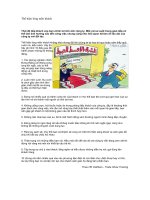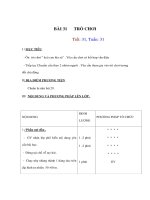Tài liệu The Xerox® ProfitQuick® Direct Marketing ROI Planner Your advanced marketing business companion ppt
Bạn đang xem bản rút gọn của tài liệu. Xem và tải ngay bản đầy đủ của tài liệu tại đây (1.35 MB, 8 trang )
Digital Business Resources
ProfitAccelerator
®
Direct Marketing
ROI Planner
Brochure
The Xerox
®
ProfitQuick
®
Direct Marketing ROI Planner
Your advanced marketing
business companion.
2
The Direct Marketing ROI Planner is a
powerful Xerox
®
marketing tool designed to
demonstrate and project the complete Return
on Investment (ROI) of a direct marketing
campaign or program. It is not just another
ROI calculator but an advanced provider of
true projections and results to evaluate the
effectiveness of your direct marketing projects,
giving you the ability to compare campaigns
and evaluate risk.
“What a fantastic tool this will be
for marketers! I have seen a few ROI
calculators, but never one this complete
for one to one campaigns and never
one that is this easy to understand. You
have taken what one to one marketers
have been telling their customers for
years, and you have turned it into a
quantifiable resource. This will make it so
easy to tell the story!”
– Bob Pente
President
Wired Pente Inc., Canada
The Direct Marketing ROI Planner is the
business partner of marketers to forecast and
report results to their board of directors. An
instant score card and a true campaign enabler
that not only presents standard statistics, but
also outlines the overall profitability of the
products or services sold.
At last, a simple, quantifiable planning resource
Taking full advantage of the Direct Marketing ROI Planner is simple.
You only need to enter a few important pieces of data for the ROI results to be
calculated and instantly populated in the Key Results window. The Direct Marketing
ROI Planner is impressive in its results, yet is amazingly easy to navigate. The only
data you need to add is in the Key Campaign Data section. You will then spin the
Tuner Wheels to customize your opportunity scenarios prior to simply pressing the
green Calculate button.
The Direct Marketing ROI Planner
enables
you to see all the figures and results of your
direct marketing campaign to an impressive
level of business detail. It is also a great
forecasting tool that allows marketers to
compare different campaigns. Now you
can quantify your risk of transitioning from
conventional marketing to 1:1 direct marketing.
©2010 Xerox Corporation. All Rights Reserved.
3
Have you ever tried to justify
new marketing projects?
If you wish to compare a current campaign
that you are running with one that you are
planning using 1:1 marketing*, now you can use
this Xerox
®
ProfitQuick
®
Direct Marketing ROI
Planner as a comparison and forecasting tool.
1. Let’s Get Started!
Follow these steps to enter your data in the
Direct Marketing ROI Planner.
No. of Mail Pieces Sent: Enter in this field
the number of direct mail pieces that you
have sent or plan to send, e.g. 100,000
pieces. If you plan to send the same number
of pieces for your 1:1 marketing campaign,
enter the same number in both Current and
1:1 Campaign columns.
* Variable data campaign customized to each individual.
Here is an example of the fields you could include:
Design $15,000
Printing and fulfillment $29,000
Data processing $06,000
Micro site development $12,000
Total $62,000
divided by quantity of 100,000 =
Unit Cost of $ 0.62
(You would enter $0.62 cents as a cost per mail piece sent.)
If you plan to send fewer or more mail
pieces in your new 1:1 campaign, simply
add the new quantity.
Cost per Mail Piece: In this field it is important
to enter the total cost of your campaign
including design, printing, postage and all
related costs. Prior to entering the data, you
must divide your total amount by the number
of pieces sent to achieve a unit cost per piece.
Then, enter the unit cost per piece.
If you compare two campaigns, it is also
important to enter in the 1:1 Campaign field
the new cost (or the estimated new cost) of
this campaign. For an accurate comparison,
be sure you are calculating all the same
components in each column (e.g., do not
include design or postage in one column but
forget to include it in the other, etc.).
Response Rate per Prospect: To be accurate,
enter the percentage of responses you have
received by mail, through your website and/
or call centers; whichever way you have asked
the prospect to contact you. As an example, a
multi-channel campaign that generated 1,000
calls, 2,000 coupons or responses by mail and
1,000 clicks on your website (using a Personal
URL to track) would be considered as 4,000
prospects, which converts into a 4% response
rate. You would enter 4% in the current
Response Rate field section.
Note: You will notice that you cannot enter
a response rate for the 1:1 campaign, this is
simply because we will use the Tuner Wheel
below for forecasting different scenarios.
For accurate measures, ensure that your
response rates are only the ones related to
your campaign and not the regular traffic of
the call center or the web.
4
Revenue per Sold Item: If your campaign
has only one product offer such as a mobile
phone at $500, enter the amount related to
your product. If you have several products, you
would enter the average of the products’ value
per item. In other words, if you have sold one
at $500, one at $800 and one at $1,075,
you would have an average revenue per
sold item at $791.66 ($500 + $800 + $1,075 =
$2,375/3 items = $791.66). The revenue
per sold item is also easy to find by taking the
total revenue divided by the number of clients
who purchased.
For the estimate of the 1:1 campaign revenue,
enter the same Revenue per Sold Item amount
until your new campaign validates higher
revenue per sold item. At the forecasting stage,
you do not know yet if the new campaign will
generate higher revenue per sold item.
Cost per Sold Item: In reality, the full cost
(weighted cost) of a sold item also includes
elements such as the cost of the actual product
(hard cost), shipping, warehousing, processing
the order and other internal costs related to
the sale of the product (soft costs). Not all
marketers have the full details of their total
product cost, so the best cost per sold item is
the one you know and use regularly. If you only
know the hard cost of your product, enter this
value in the relevant field. Taking the example
of the same mobile phone at $500 and giving
a cost value of $250 for the product, you would
enter $250 in the Cost per Item Sold field. A
financial or insurance institution, for example,
would enter the average unit cost of processing
the order in the system, the value of the
commission to the broker, management fees,
etc., as the cost of the sold item.
For the forecasting of the 1:1 campaign, you
would likely enter the same amount as the
Current column since the cost of your product
should be the same. Eventually, your cost of
product of your new campaign may evolve to
new values considering that you may upsell
your targeted offer. If you do have the new
cost of your product, enter this new cost in the
1:1 Campaign field.
Conversion Rate (Prospects to Clients): The
conversion rate is the ratio that is achieved
from calculating the number of prospects that
became clients, i.e., the ones who purchased
the items. If you had 4,000 prospects and you
sold 400 phones, you have a conversion rate of
10%. If you never calculated your conversion
rate before and wish to do an estimate, you
can use industry averages such as closing 1
out of 5 prospects (conversion ratio of 20%). If
all your prospects would purchase, you would
reach a 100% conversion rate.
You cannot enter a conversion rate for the 1:1
campaign estimate because we will use the
Tuner Wheel at the bottom of the window to
enter the estimated projections.
5
Estimated Value per Prospect: It is next
to impossible for a prospect or the sum of
prospects to have no value to your business.
For this reason we have set a minimum
amount of $1 as a default setting in this field.
A prospect has more propensities of buying
your product in the future or be more
responsive to your next solicitation. As well,
the names of prospects that you accumulate
in your database no longer need to be
rented at a cost; hence the minimum value
of a prospect is a valid figure that you should
consider in your overall tracking. This number
will not influence your total ROI calculation
and will be provided separately in the Tracking
window, but we wanted to show you this
figure to make you aware of the importance
in value of getting more people responding
to your campaigns. When you do your next
direct marketing campaign, the value of your
prospect can be considered as an economic
value to be applied on your next projection.
“Not only will this be invaluable for
planning campaigns, but I can see it
being very valuable for post-analysis
and even more importantly, for
scenario planning. I want one!”
– Bob Pente
President
Wired Pente Inc., Canada
“First, this is a terrific tool, best I’ve seen.
I deliberately did what most blokes do
to really test its user friendliness. I did
not read the detailed instructions first!”
– Geoff Collins
Managing Partner
Wunderman, Thailand
Some marketers have calculated a defined
value of what a prospect is worth for their
business and should enter that real number in
the Estimated Value Per Prospect field. Enter
the same number in each of the two fields from
the Current and 1:1 Marketing columns until
you know the exact value of a prospect coming
from a 1:1 campaign.
Cost Savings/Extra Costs: This field was
created for special one time costs that you
need to track. Examples could include a
Campaign Coordinator or a Data Mining
Consultant that you perhaps never had to
use before, etc. Use this space to add these
one time costs as a lump sum (not cost per
unit) such as $2,000 or $4,000. This cost
will be reflected accordingly in your total
cost of campaign in the Key Results window.
If you wish to enter a cost saving value,
enter “–” (minus) before the amount. Enter
“0” if there are no extra costs.
6
2. Using the Tuner Wheels
You have three Tuner Wheels to spin to finalize
your data input. The first wheel allows you
to estimate a conservative scenario for the
new 1:1 campaign. The second Tuner Wheel
is for you to create a second forecast using an
optimistic scenario. The third wheel is provided
to give you the flexibility of changing the
Estimated Conversion Rate simply because
when you customize and personalize your
campaign, it is likely that you will achieve a
higher conversion of prospects to clients rate.
Estimated Conservative Response Rate
(Prospects): Drag your mouse pointer to the
top of the Tuning Wheel and spin it clockwise
to set the Estimated Conservative Response
Rate desired. For instance, if you entered 4%
in your Current campaign column, turn the
wheel to 5% for the conservative estimate
scenario. The number you choose is the one
campaign, spin the wheel to the same
number. Now you have the flexibility to
enter a different conversion scenario simply
because it is very plausible that you would hit
a higher conversion rate with a customized 1:1
campaign vs. that of a generic one.
Calculate: You are now ready to click the green
Calculate button to get your comprehensive
set of statistics and ROI. It will be displayed
instantly in the Key Results window.
3. Key Results
All the important Direct Marketing ROI Planner
data for your campaign is now displayed in
the Key Results window. Note that your Total
Number of Mail Pieces Sent is repeated for
each scenario. The Cost Per Mail Piece is also
repeated and if you previously added a Cost
Savings/Extra Cost, this amount would be
displayed as a unit cost in the Total Cost
per Piece.
you should feel comfortable with. If you want
a very high number, turn the wheel higher (the
wheel can reach 100%).
Note: The tuner is indicating a response
rate value and not an incremental value
of response. If you enter 5%, the Xerox
®
ProfitQuick
®
Direct Marketing ROI Planner
will calculate your Estimated Conservative
Response Rate at 5%.
Estimated Optimistic Response Rate
(Prospects): Again, drag your mouse
pointer to the top of the wheel and spin it
clockwise to the desired Estimated Optimistic
Response Rate you wish to forecast in your
second scenario.
Estimated Conversion Rate (Prospects
to Clients): We have created this wheel to
enter a new estimated conversion rate. If
you wish to keep the same conversion rate
that you previously entered for your current
7
The Total Campaign Cost is a reflection of your
cost per mail piece multiplied by your quantity
sent. The Total Cost per Sold Item is calculated
considering the number of clients who have
purchased your product times your cost per
sold item.
The Total Campaign Cost is the cost of your
direct marketing campaign + the Total Cost per
Sold Item.
The Total Revenue is displayed as well as the
Total Profit, which was achieved by subtracting
the Total Campaign Cost from the Total
Campaign Revenue. The Total Revenue reflects
the number of clients who purchased your
product or service at the average price you had
determined in your Revenue per Sold Item field.
The Total Campaign ROI is calculated as a
percentage of your return on investment in
achieving the targeted campaign results. The
same logic applies in the forecasting of the
conservative and optimistic scenarios. You can
see the ROI percentage of each scenario.
Acquisition and Conversion Results
In this window you will find very useful
information that smart marketers will take
under consideration in their decision making
process and particularly to validate the ROI
of a campaign. For example, as you use the
Xerox
®
ProfitQuick
®
Direct Marketing ROI
Planner, you will sometimes notice that you
may increase your marketing production cost
for a 1:1 marketing campaign and yet reduce
significantly your cost of acquiring a prospect
and/or a client.
The Acquisition Cost of a Prospect is the cost
of your campaign divided by the number of
respondents (prospects). This value is the
true cost of each person who responded
to your campaign. It is the cost of getting
them to react. The same logic applies for the
Acquisition Cost of a Client. The acquisition
cost is a key metric of success when evaluating
the ROI of a campaign. One of your goals
would be to reduce this cost. The more people
react, the lower your acquisition cost will be.
4. Break Even Point for
Cost Justification
The results displayed in the Break Even Point
for Incremental Cost Justification window
are key to evaluate your risk in converting
your current way of doing direct marketing
campaigns to the new 1:1 campaign model.
The numbers displayed demonstrate how
many prospects and how many clients you
would need to acquire in your new scenario
to break even and achieve the same profit
as your current campaign. It also displays
the percentage of prospect response rate
you would need to break even with the new
incremental cost of the 1:1 campaign. For
example, if you entered a 4% response rate
in your current campaign and the Break Even
Point percentage shows 4.5%, it would mean
that you need an incremental 0.5% response
rate to justify the new cost of the campaign;
hence, you have a very low risk. It also helps
you understand if your conservative estimate
at 5% was a good estimate.
If your current campaign was attracting 4,000
prospects and the Break Even Point window
displays 4,100, you will need only 100 more
prospects to break even in your ROI scenario;
this is another low risk opportunity. The same
logic applies for the number of acquired clients
and the final client response rate.
To learn more about our comprehensive
portfolio of world-class resources,
visit us at: www.xerox.com/driveprofit
©2011 Xerox Corporation. All Rights Reserved. XEROX, XEROX and Design® and ProfitAccelerator®, ProfitQuick® and
SmartPress Production Consultants® are trademarks of Xerox Corporation in the United States and/or other countries. T-224 03/11
701P50525
Proven.
Xerox
®
ProfitAccelerator
®
Digital Business Resources help you grow your
profits, revenues and success every step of the way.
The ProfitAccelerator Collection offers something for everyone in the
organization. The Collection helps support executives, sales and marketing
and operations throughout the entire business development process. Xerox
®
has a team of professionals committed to your success that delivers consulting,
sales, marketing, workflow and application development services.
ProfitAccelerator Resources are delivered worldwide through a network of
several hundred customer business development professionals, including Xerox
®
sales and marketing managers, analysts, SmartPress Production Consultants
®
,
business development consultants and external consulting partners.









